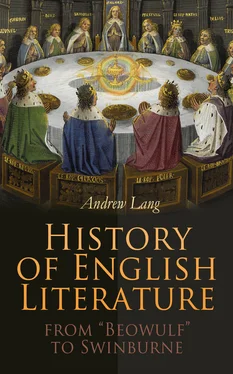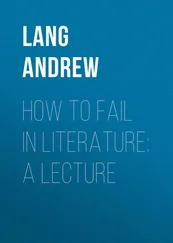After this long and excellent passage of true poetry, fashion compels the King to visit the Palace of Venus and see the lovers of old times, converse with Venus and with Pallas, and visit Fortune with her Wheel, and take his place on it; then he awakes not "seeing all his own mischance". A white turtle-dove brings him flowers, and a glad message in letters of gold; and he blesses birds and flowers and even his prison wall, and
the sanctis marciall
That me first causit hath this accident.
The poem ends with an invocation of the shades of his "masters dear," Gower and Chaucer.
The manuscript, of about 1488, ascribes the poem to King James, so does Major or Mair, a not too trustworthy historian. The language is northern English, mixed with Scots, with many borrowings from Chaucer. The story indicated is true of James and of no one else, but the usual attempt has been made to deprive him of the authorship—wholly without success. The measure is the "rhyme royal" of Chaucer's "Troilus and Criseyde". The scansion is remarkably correct, and the lines have a melody not common in the works of Chaucer's followers. There is a strong moral element in the reflection and discourses.
Not a King like James I, nor a courtier priest, like Dunbar, his junior, but a schoolmaster of the Benedictine Abbey-school at Dunfermline, Robert Henryson had, among Scottish poets of his day, the greatest share of the spirit of their master, Chaucer. He may be the Robert Henryson who, already a Bachelor of Arts, joined the University of Glasgow in 1462, but nothing is certainly known of him. He wrote his "Morall Fabillis of Esope"
by request and precept of a lord,
Of whom the name it needs not record,
to he apparently had a patron destitute of vanity, and not ambitious of publicity. Henryson regarded Æsop, the mythical Greek slave, as "a noble Clerk," and made his own use of the tales of talking beasts, birds, and fishes, which are told among savages in most wild countries, and reached him, some of them by way of India, filtered through Latin, French, and English authors.
The animals are perfectly human in character, and give to Henryson, as later to Prior and La Fontaine, the opportunity to show his own wit, humour, and tolerant gentle nature. The tales are told in the seven line stanza, rhyme royal, of Chaucer's "Troilus and Criseyde". Even to-day they may be read with unfeigned pleasure, for their humorous and human studies of character, for their unostentatious pictures of nature, of the little nest of the field mouse, the moors, the stubble fields, the warm storeroom of the burgess's house, where the town mouse has her hole, and for the unaffected sympathy with our wild kindred of fur and feather. The chatter of the hens, the widows of Chanticleer, when the fox, who has claimed old family friendship with the cock, flatters his vanity and carries him away, is far more pleasing than Dunbar's satire on his revolting Widow and two married women. One hen, Pertok, makes bitter moan for the cock, the common husband of them all, but Sprutok declares her intention to sing, "Was never widow so gay"; she enumerates the faults of the dear deceased; Pertok comes into her way of thinking; and Toppok speaks of the faithlessness of their late Lord. Heaven has punished Chanticleer, who, after all, cheats the fox, and returns to his harem.
"The Two Mice" is especially humorous, and as sympathetic as Burns's poem "The Twa Dogs". The tale is so vivid that we feel the keenest anxiety when Gib, or Gilbert, "our Jolly Cat," pounces on the country mouse; the town mouse knows her hole, and has fled thither. The horror of the town mouse when she has rural dainties placed before her by the country mouse, her mincing airs of patronage, are delicately touched; in short, with the Fox's confession to the priestly Wolf, and the Trial of the Fox; and the strained law which the Wolf administers to the Lamb, the fables are animated and delightful poetry in their kind: the Morals, as when the hard lot of the poor husbandmen is described, are far from contemptible. Had Henryson left nothing else we must recognize in him a true son of Chaucer.
His "Testament of Cresseyde" begins from a bitter winter night, when alone and snug in his warm room, he mends the fire, takes a drink, lays down his Chaucer, and ends the tale of fair false Cresseyde, whom Chaucer pitied. Chaucer was not the man to have created, like Thackeray, that other Cresseyde, Beatrix Esmond in her matchless bloom of triumphant beauty, and later to have drawn her as the old Baroness Bernstein. What Chaucer held his hand from,—the mediaeval tale of the punishment of false Cresseyde,—Henryson, not without a passion of pity, undertook. The gods sent on Cresseyde's beauty the plague of leprosy, a terrible malady scarcely known by name to the Greeks, but as common in the Middle Ages as in ancient Israel.
Diomede deserts Cresseyde; she becomes the common "spoil of opportunity," and returns to her father Calchas, priest of Venus. But "into the Kirk" Cresseyde is ashamed to go. In a trance she comes into the presence of Saturn, a frozen god, and of the other old deities. Saturn then condemns her. The lady awakes and sees in her glass that she is a leper. She goes to the lazar-house, she dwells and begs with the lepers: Troilus rides past, and knows her not, but, in some faint way, memory of his love for Cresseyde wakes in him, and for his lost love's sake he gives to the leper lordly alms, "a purse of gold and many a gay jewel".
And nevertheless not are are uther knew.
But another leper recognized Troilus, and Cresseyde, smitten to the heart, made her moan and her Testament, leaving to Troilus the royal ring and red ruby that he had given her long ago. So she died, and Troilus raised a tomb of marble to
Cresseid of Troyis toun,
Sumtyme countit the flour of Womanheid.
In the poem of this adventure there are but 616 lines; and it contains the poignant essence of romance; all passion and pity. Nothing in the poetry of Scotland excels, perhaps nothing but here and there the cry of a ballad, or of Scott's "Proud Maisie," approaches in excellence this work of the schoolmaster of Dunfermline.
His "Robene and Makyne," or love-dialogue between a lad and lass, the girl first wooing and repulsed; then wooed and scornful, is in a charming measure, and may have imitated some ancient French pastourelle.
The "Orpheus and Eurydice," that sad and beautiful tale—told by Maoris in New Zealand, and by Iroquois in America—of the man who seeks his dead wife in Hades, has merit in Henryson's version. The passage of Orpheus to and through Hades, where his music consoles Tantalus and Theseus, and wins the grace of Persephone, is excellent; the tragic close is not successfully handled, and the long Moral is tedious. A number of moral poems do not transcend the common course of those things, and Henryson lives by his "Fables," his "Testament of Cresseid," and "Robene and Makyne".
These, with the sympathetic kindliness of his unrepining nature place him, if an individual opinion may be given, high above his more famous contemporary, Dunbar.
William Dunbar, whom Scott declared to be the greatest poet of Scotland prior to Robert Burns, took the degree of Bachelor of Arts at St. Andrews in 1477. Much later, lads of seventeen or even of fourteen, graduated, so Dunbar may have been born (in East Lothian) so early as 1460. His language, with some southern English tincture, is that of the most Anglicized part of Scotland. The Earls of Dunbar were a great shifting power on the Border, and Dunbar's name, at least, was noble, he may have come of Cospatrick's line (Earls of March).
A favourite Scottish form of verse was the "Flyting" (scolding) or humorous raillery, and Dunbar's opponent, Walter Kennedy, represented a very old Celtic clan of Galloway and Ayrshire: Dunbar banters him on his "Irish" dress and accent. Dunbar was brought up to be a Churchman, and was a novice in the Order of St. Francis, "begging with a pardon in all Kirks". From 1479 to 1491, he was travelling abroad, preaching and begging in France, far from honestly, he says:—
Читать дальше












